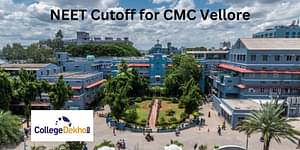MD Radiodiagnosis
MD Radiodiagnosis Course Overview
Doctorate of Medicine or MD Radiodiagnosis is a doctorate-level course. Students can apply for this program after securing their MBBS degree with at least 60% aggregate marks. After enrolling in this course, students learn about clinical specialties for obtaining medical images using various types of machinery like MRI, CT Scan, X-Ray, etc.
Applicants of this course have to start preparing from their higher secondary educational level by studying physics, chemistry, and biology as their core subjects. After that, they have to enroll in the 5-year MBBS degree program. After finishing MBBS, students need to clear the entrance exams like INI CET, PGIMER, etc. that are held for admission to postgraduate courses.
Graduates of this course are eligible to find employment in all private and public sectors of the country. Top colleges like All India Institute of Medical Science (AIIMS), Armed Forces Medical College, Kolkata Medical College, Kasturba Medical College, etc. offer MD Radiodiagnosis degrees to students. Some of the top agencies who recruit these graduates are; Apollo, Columbia Asia, Sun Pharma, Siemens Healthcare, Hologic, etc. In India, the average course fee for MD Radiodiagnosis is 50,000 to 8,00,000 INR per year. Some of the top designations associated with this degree are CT Scan Specialists, Professor, MRI Technician, etc.
Table of Contents
- MD Radiodiagnosis Course Overview
- MD Radiodiagnosis Course Highlights
- Why Choose MD Radiodiagnosis Course?
- Entrance Exams for MD Radiodiagnosis Course
- MD Radiodiagnosis Eligibility Criteria
- Admission Process of MD Radiodiagnosis
- Colleges in India Offering MD Radiodiagnosis Course
- Colleges Abroad Offering MD Radiodiagnosis Course
- Colleges in India for MD Radiodiagnosis Course (State and City Wise Distribution)
- Course Fee for MD Radiodiagnosis
- Syllabus for MD Radiodiagnosis
- Subjects Under MD Radiodiagnosis
- Best Books for MD Radiodiagnosis
- Career Prospects After MD Radiodiagnosis
- Top Recruiting Agencies
- Skills Required for Successful MD Radiodiagnosis Career
- FAQs about MD Radiodiagnosis
MD Radiodiagnosis Course Highlights
The important information regarding MD Radiodiagnosis is presented in this table for your convenience.
Course Name |
Doctorate of Medicine in Radiodiagnosis |
|---|---|
|
Course Duration |
3 years |
|
Course Level |
Doctorate |
|
Course Fee |
50,000 to 8,00,000 INR |
|
Examination Pattern |
Semester |
|
MD Radiodiagnosis Admission process |
Entrance exam, Counseling, Personal Interview, Group Discussions |
|
Admission |
Through entrance exams conducted by respective colleges |
|
Minimum Aggregate Required for MD Radiodiagnosis |
60% in high secondary level and 50% in MBBS level with a 1-year internship. |
|
Top Colleges for MD in Radiodiagnosis |
|
|
Average Salary |
4,00,000 to 12,00,000 INR |
|
Designations |
|
|
Recruiting Organizations |
Apollo Super Speciality Hospital, AIIMS, GNRC |
Why Choose MD Radiodiagnosis Course?
There are many reasons that a student can take into account before taking up MD Radiodiagnosis as their doctorate-level study. Some of the prominent ones are stated below:
-
Students are introduced to all the newest and most updated versions of medical equipment available in the market.
-
Since this course comes with a lot of research opportunities, candidates willing to continue their education in the research line can choose this subject. There are many fellowships and research grants that they can avail of after completing an MD Radiodiagnosis degree.
-
Since this job involves precision, aspirants who are intellectual and perfectionists may find professional satisfaction.
-
Both government and private sector employers employ these professional graduates of MD Radiodiagnosis. All the job profiles come with high compensation and several other benefits.
-
The job opportunities for MD Radiodiagnosis graduates are increasing day by day.
-
Graduates play vital roles in assisting other medical practitioners to diagnose diseases and prescribe the right medicines by identifying all the abnormalities in the body with the help of medical imaging.
-
Those who want to make their foundation strong in the radiology stream can choose this course.
Entrance Exams for MD Radiodiagnosis Course
There are many entrance exams conducted every year for admission to the MD Radiodiagnosis course. Some of the popular exams taken by the majority of students are
INI CET: It is a computer-based online test conducted by the All India Institute of Medical Sciences (AIIMS), every year. It is divided into two sessions. Students are asked 200 multiple-choice questions that cover the entire MBBS syllabus. The duration of this test is 3 hours. There is a negative marking for each wrong answer. Several types of questions that are asked to the students include true and false, single-best answer type, match the following type, multiple completion, asserting reasons, sequences and arrangements.. The core clinical, pre and post-clinical subjects that are covered while framing the questions include anatomy, biochemistry, physics, pathology, pharmacology, forensic medicine, pediatrics, gynecology, community medicine, etc.
PGIMER: For admission to postgraduate courses of medical studies, the Post Graduate Institute of Medical Education and Research conducts this entrance test twice every year. Multiple core topics like radiology, ophthalmology, cardiology, gynecology, public medicine, general medicine, forensic medicine, psychiatry, pediatrics, etc. are covered while framing the questions. The duration of this test is 3 hours. There is no negative marking for any wrong answer. All the questions are multiple-choice based. Applicants have to sit for this exam from designated exam centers and take this test online in computer-based mode.
NEET-PG: This is a national-level entrance test that is held every year for offering admission to all the postgraduate degree courses in medical studies. The total mark for this exam is 800. All the students get 3 hours and 30 minutes to finish this exam. This is a computer-based exam.. English is the mode of language for this test. Candidates have to answer a total of 200 multiple-choice questions. For each correct answer, students are awarded 4 marks and for each incorrect answer, 1 mark is deducted. There is no negative marking for unattempted questions. The entire syllabus of MBBS is included in this test.
MD Radiodiagnosis Eligibility Criteria
The minimum eligibility criteria for admission to MD Radiodiagnosis are
-
Students should have completed their MBBS degree or any other relevant undergraduate degree in medical studies.
-
Biology, physics, and chemistry are mandatory core subjects that students need to study in their high secondary education.
-
Candidates need to complete a 1-year in-house internship after the completion of the MBBS degree course.
-
It is mandatory for all MS Radiodiagnosis aspirants to sit for entrance tests conducted by several colleges every year.
-
Students looking for admission into top colleges of the country, have to pass the NEET-PG test with at least 50% percentile.
-
There are several scholarship options for students who want to pursue this degree from any foreign university. The minimum eligibility criteria for taking admission to these colleges is clearing the English Proficiency tests like TOEFL, IELTS, etc. along with submitting other relevant documents.
Admission Process of MD Radiodiagnosis
The admission process for MD Radiodiagnosis involves a few steps.
-
Students need to apply for the entrance exams held by the universities every year.
-
They have to maintain 60% aggregate marks in their MBBS degree.
-
Completion of a 1-year in-house internship is mandatory.
-
After submitting all the above-mentioned documents, eligible candidates can sit for the exam.
-
Exams are conducted online mode through designated exam centers selected by the exam authority.
-
All the successful candidates are ranked according to the marks obtained by them.
-
The ranking of the students determines the colleges to which they will be eligible to take admitted.
-
For knowing the preference of the students, the exam board conducts a round of counseling with the students.
-
Before the final admission, most of the colleges hold their personal round of interviews with the applicants.
-
Many colleges also ask candidates to participate in group discussions as part of their admission process.
Colleges in India Offering MD Radiodiagnosis Course
College/University |
Entrance Exam |
Location |
|---|---|---|
|
Gandhi Medical College |
NEET-PG |
Telangana |
|
NEET-PG |
Maharashtra |
|
|
NEET-PG |
Gujarat |
|
|
Baba Farid University of Health Sciences |
NEET-PG |
Punjab |
|
Bangalore Medical College and Research Institute |
RUGHS |
Karnataka |
|
Post Graduate Institute of Medical Education and Research |
NEET-PG |
West Bengal |
|
NEET-PG |
Delhi |
Colleges Abroad Offering MD Radiodiagnosis Course
There are many colleges in foreign countries that offer MD Radiodiagnosis degrees. Some of the most popular colleges are listed below:
College/University |
Country |
|---|---|
|
University of Manchester |
United Kingdom |
|
Heidelberg University |
Germany |
|
University of Waterloo |
Canada |
|
John Hopkins University |
United States of America |
|
University of California |
United States of America |
|
Stanford University |
United States of America |
|
University of London |
United Kingdom |
|
University of Adelaide |
Australia |
|
King's College of London |
United Kingdom |
|
University of Auckland |
New Zealand |
|
Cardiff University |
United Kingdom |
|
Imperial College |
United Kingdom |
|
Illinois College of Optometry |
United States of America |
|
University of Bradford |
United Kingdom |
|
Nova Southeastern University |
United States of America |
Colleges in India for MD Radiodiagnosis Course (State and City Wise Distribution)
Several colleges in India offer MD Radiodiagnosis degrees to students. The name of the colleges are listed below:
Andhra Pradesh |
|
|---|---|
|
University/College |
City |
|
Guntur |
|
|
Srikakulam |
|
|
GSL Medical College and General Hospital |
Rajahmundry |
|
Guntur |
|
|
Siddhartha Medical College |
Vijayawada |
|
Narayana Medical College and Hospital |
Nellore |
|
PES Institute of Medical Sciences and Research |
Kuppam |
|
Santhiram Medical College and General Hospital |
Nandyal |
Maharashtra |
|
|---|---|
|
University/College |
City |
|
Maharashtra Government Medical College |
Latur |
|
Pune |
|
|
Seth GS Medical College |
Mumbai |
|
Armed Forces Medical College |
Pune |
|
Navi Mumbai |
|
|
Pune |
|
|
Dr. DY Patel Vidyapeeth |
Pune |
|
Rastrasant Tukadoji Maharaj Nagpur University |
Nagpur |
Madhya Pradesh |
|
|---|---|
|
University/College |
City |
|
Netaji Subhash Chandra Bose Medical College |
Jabalpur |
|
Gandhi Medical College |
Bhopal |
|
Bhopal |
|
|
LNCT University |
Bhopal |
|
Gwalior |
|
|
Index Medical College Hospital and Research Center |
Indore |
|
Sri Aurobindo Institute of Medical Sciences |
Indore |
|
Chirayu Medical College and Hospital |
Bhopal |
Delhi NCR |
|
|---|---|
|
University/College |
City |
|
Delhi |
|
|
Sardah University |
Noida |
|
New Delhi |
|
|
Lady Hardinge Medical College |
New Delhi |
|
New Delhi |
|
|
All India Institute of Medical Sciences |
New Delhi |
|
New Delhi |
|
West Bengal |
|
|---|---|
|
University/College |
City |
|
West Bengal University of Health Sciences |
Kolkata |
|
Kolkata Medical College |
Kolkata |
|
Institute of Post-Graduate Medical Education and Research |
Kolkata |
|
Midnapore Medical College and Hospital |
Midnapore |
|
Kolkata |
|
Karnataka |
|
|---|---|
|
University/College |
City |
|
JSS Academy of Higher Education and Research |
Mysore |
|
St. John’s Medical College |
Bangalore |
|
Bangalore Medical College and Research Institute |
Bangalore |
|
Mangalore |
|
|
AdiChunchanagiri University |
Mandya |
|
Belagavi |
|
|
Yenepoya University |
Mangalore |
|
Bangalore |
|
|
NITTE |
Mangalore |
|
Kasturba Medical College |
Manipal |
Course Fee for MD Radiodiagnosis
The course fee for MD Radiodiagnosis varies from one college to another. Several determinants play a key role while framing the fee structure of this course. Since this is a doctorate-level course, much in-depth research, frequent laboratory usage, conducting high-level seminars, internship opportunities, etc. are involved. All these things are considered while framing the course fee structure. Other factors include the facilities available at the college/university, the faculty of the college, the location, and how updated laboratory equipment is available at the college laboratory, among others.
In India, the course fee also depends on whether the college is Government or public owned, or whether it is a private college or not. The average course fee for MD Radiodiagnosis in government colleges of India lies within the range of 50,000 to 2,00,000 INR. Students choosing to study at private universities pay an average course fee of 5,00,00 INR.
Syllabus for MD Radiodiagnosis
The coursework for MD Radiodiagnosis is divided into 6 semesters, for 3 years. During this term, students have to attend seminars, participate in group projects, give demonstrations of surgical methods and learn laboratory techniques. They also have to write a research paper and sit for a comprehensive viva round. The division of the theoretical exam is given below:
Semester 1 |
Semester 2 |
Semester 3 |
Semester 4 |
Semester 5 |
Semester 6 |
|---|---|---|---|---|---|
|
Mammography and Breast Intervention |
General Radiology |
Gastrointestinal (GIT) and Hepato-Biliary-Pancreatic System |
Musculoskeletal System |
Radiology Emergency Medicine |
Contrast Media |
|
Basic science related to the specialty of Radio-diagnosis |
Anatomy |
Genito-Urinary System |
Practical radiography |
Cardiovascular Radiology |
Pathology |
|
Respiratory System |
Practical Schedule |
Neuro-Radiology |
Subjects Under MD Radiodiagnosis
There are many subjects taught under MD Radiodiagnosis. Most of these topics introduce the students to preliminary and advanced levels of knowledge of Radiology. Some of the core subjects that are taught are listed below:
General Radiology: Under this subject, education related to the rudimentary idea of radiology is imparted to the students. Students get to learn all the basic definitions and features included in Radiology.
Anatomy: For all the professional graduates of MD Radiodiagnosis, this is one of the most vital subjects to study. Candidates need to have a better understanding of anatomy to examine the affected areas.
Cardiovascular Radiology: Here, the candidates are taught about the radiography of the chest area thoroughly. Every technique that is used to create images of the heart and the surrounding blood vessels are taught under this subject.
Neuro Radiology: As the name suggests, this subject describes all the methods that are used in order to take medical images of the brain, spinal cord, muscles, tissues, and blood vessels. Neurologists take assistance from radiologists in case of major surgeries or other major diagnoses. Thus, making it an important subject under MD Radiodiagnosis.
Respiratory System: The professionals of MD Radiodiagnosis must have an idea about the respiratory network of the body. This includes the lungs and the surrounding blood vessels. For taking proper medical imaging, it is necessary to be thorough with the position and functions of these vital organs of the body. This is taught under the Respiratory System subject.
Best Books for MD Radiodiagnosis
Some of the best-suggested reads for students of MD Radiodiagnosis are:
Books |
Author |
|---|---|
|
Orthopedic Knowledge Update |
J.Sybil Biermann |
|
Genitourinary Imaging |
Ronald J. Zagoria |
|
Chest Radiology |
James C. Reed |
|
Vascular and Interventional Imaging |
Nael Saad |
|
Endovascular Therapy |
Renan Uflacker |
|
Pediatric Radiographic Interpretation |
Charles Dixtar |
|
A Short Textbook of Oral Radiology |
Kumar |
|
Radiographers and Imaging Techniques in Prosthodontics |
Bhavna Ahuja |
|
Learning Radiology |
William Herring |
|
Core Radiology |
Ellen X.Sun |
Career Prospects After MD Radiodiagnosis
There are a lot of job roles available for professional graduates of MS Radiodiagnosis degrees. They are eligible to work in both the private and public sectors of any country. Some of the highest-paying designations that are available are listed below for your convenience:
Designation |
Job Profile |
Average Salary Scale |
|---|---|---|
|
Radiologist |
Their job mainly includes interpreting medical images, X-Rays, reports of CT-Scans and MRIs in order to check for any diseases or tumors. They do not have the license to prescribe medicines to patients and mostly work in their designated areas in hospitals and chambers. |
5,00,000 to 30,00,000 INR |
|
Radiographers |
People working as radiographers mainly look after the overall operation of all the machines used to produce medical images for diagnosis purposes. They maintain the quality of machines like MRI Machines, CT Scan machines, etc. |
2,00,000 to 8,00,000 INR |
|
Professor |
Most of people who are interested in the academic field, opt for this career. They apply for a professor of MD Radiodiagnosis and teach students in colleges. They conduct seminars and deliver quality education. |
3,00,000 to 12,00,000 INR |
|
Ultrasound Technician |
They mainly work in the ultrasound department of chambers and hospitals. They perform the ultrasound for the patients in order to detect any abnormalities in their bodies. |
1,00,000 to 4,00,000 INR |
|
MRI Technician |
All the hospitals and chambers have separate departments for conducting MRIs. These professionals work in those departments that involve conducting MRI scans on patients. |
1,00,000 to 4,50,000 INR |
|
Radiology Assistant |
This designation involves professionals assisting and observing the work of their seniors very closely. They work as an apprentice with radiographers and other technicians in this field. |
1,00,000 to 5,50,000 INR |
Top Recruiting Agencies
There are many agencies that hire professional graduates with MS Radiodiagnosis degrees. Some of the companies that offer the most versatile opportunities to their employees are listed below:
-
Vitality Healthcare
-
Indo-American Hospital
-
Max Healthcare Institute Ltd.
-
Apollo Super Speciality Hospital
-
Recmasters
-
Fortis Hospital
-
StaffPointe Recruiter
-
ArtemisEnterprise Medical Service
-
Onyx M.D
-
Narayana Hrudayalaya Health City
-
AIIMS
-
Indian Railways
-
Columbia Asia
-
Sparsh Hospitals
Skills Required for Successful MD Radiodiagnosis Career
For making an individual successful and stand out from the rest of the group. Some of the desired skills are
-
Students should have sound knowledge of the core concepts and basics of MD Radiodiagnosis.
-
It is crucial to have an eye out for all the minute details.
-
Individuals should be able to handle all critical situations with a calm and composed mind.
-
Individuals must have the mindset and passion to help others with utmost care and compassion.
-
As their profession demands handling high-level medical equipment on a daily basis, it is a crucial skill for these professionals to possess profound knowledge about the rudimentary of all the machines.
-
Competency to assist other medical practitioners with their diagnosis.
-
Must have high analytical skills and intellectual knowledge.
FAQs about MD Radiodiagnosis
What is MD Radiodiagnosis?
A doctorate of Medicine or MD is a doctorate-level degree in Radiodiagnosis. This is an offline course with an overall duration of 3 years. Students can apply for this course after competing for their postgraduate degree in the relevant field.
Is MD Radiology and Radio Diagnosis the same?
These two courses are almost the same. Radiodiagnosis is a branch of radiology, which is mainstream. MD Radiology is the Doctorate of Medicine degree in Radiology. It is the highest level of degree in Radiology.
What to do after MD Radiodiagnosis?
There are many job opportunities available after completing MD Radiodiagnosis. Some students who want to further study can choose to complete their specialization in various subjects like; MD Cardiovascular Imaging, Neuroimaging, etc.
Is Radiodiagnosis a good career?
It is a very good career choice. There are many fast-growing prospects. All the job profiles associated with this course are high paying and include many facilities.
What is the job of Radiodiagnosis?
There are many job roles that candidates are eligible to do after becoming a professional graduate of Radiodiagnosis. Some of the major job roles are radiographers, Clinical Assistants, professors, CT Scan specialists, MRI specialists, etc.
How much does a person with an MD Radiodiagnosis degree make in India?
The average income of a professional with MD Radiodiagnosis ranges from 4,00,000 to 10,00,000 INR per annum. The earnings of these individuals depend on several factors like work experience, highest qualification, etc.
What are the minimum eligibility criteria for MD Radiodiagnosis?
The minimum eligibility criteria for admission to the MD Radiodiagnosis course is an MBBS degree or equivalent graduate degree in medical studies. At the higher secondary level, students have to study in the science stream.
What is MSc Radiodiagnosis?
Master of Science or MSc in Radiodiagnosis is a postgraduate degree course. The duration of the course is 2 years. For enrolling in this course, students need to complete an MBBS degree.
What are some top companies that hire people with MD Radiodiagnosis degrees?
People with an MD degree in Radiodiagnosis can find employment in many private and public sectors. Some of the top companies that recruit these individuals are; Apollo, Siemens Healthcare, Columbia Asia, etc.
What are some core subjects of MD Radiodiagnosis?
The course curriculum of MD Radiodiagnosis includes a study of theoretical papers, attending seminars, visiting hospitals, taking part in practical works, etc. Some of the core subjects taught in MD Radiodiagnosis are; Emergency Radiology, Pediatric Radiology, Vascular Radiology, Urology, etc.
Can Radiologists prescribe medicines?
A professional radiologist cannot write prescriptions for patients. Instead, they assist medical practitioners by examining medical images of any illness.
Is the MD Radiagnosis examination semester-based or yearly-based?
The evaluation system of the MD Radiodiagnosis course is semester-based.
What are some of the best books for MD Radiodiagnosis?
Some of the best-suggested reads for the students of MD Radiodiagnosis are;
- Genitourinary Imaging
- Endovascular Therapy
- Vascular and Interventional Imaging
- Orthopedic Knowledge Update
- Chest Radiology
What are some of the best colleges in India for MD Radiodiagnosis?
There are many colleges in India that offer MD Radiodiagnosis to applicants. Some of the popular choices are:
- Kolkata Medical College
- All India Institute of Medical Science
- Jawaharlal Nehru Medical College
- Coimbatore Medical College
- Institute of Medical Science
Related Questions
Popular Courses
- Courses
- MD Radiodiagnosis


















